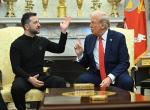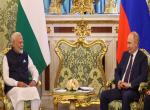West Asia never ceases to spring surprises. 2022 was no different in that regard except that conflicts became milder but the Black Swan events did not spare them either. As the countries, even the oil rich ones, were beginning to come out of the adverse impacts of the Covid 19 pandemic the Russia-Ukraine war threw newer challenges where not only their economy but the politico-strategic tools had to be honed and sharpened. Choice between the national interest and pandering to the whims of international hegemony had to be calibrated and exercised with firm conviction or as a stratagem of deliberate policy veering towards strategic autonomy. For that it was also an imperative to not only spread the risks but also to reduce the intensity of regional conflicts and enhance rapprochement, wherever possible. It is a difficult choice as the world order is under tremendous stress and unpredictable transition while Cold War 2.0 is threatening to occupy the global discourse.
The region has always been a playfield for historic rivalries underpinned by the geo political, geo economic and geo religious contestations which have kept the big powers engaged due to oil riches, petro dollars, sovereign wealth funds , maritime security and trading lanes, piracy and choke points, and the geo strategic location between the East and the West . But post US extraction from Afghanistan and its erratic policies and uncertainty of its security umbrella for the region the local anxiety was bound to be expressed in a policy shift by local majors and erstwhile close alliance partners like the GCC countries and even Israel. Of course the Palestinian issue, and general apathy combined with donor fatigue, has got a short shrift from regional and international actors except some peripheral lip sympathy and support which was evident as the US tried to create a partial Israel- Arab bonhomie through the Abraham Accords (Israel, UAE, Bahrain, Morocco and Sudan) and even the I2U2 (involving UAE, USA, Israel and India) mechanisms.
While the intra-regional competition was somewhat obfuscated despite profuse mistrust so well entrenched among the Riyadh- Tehran- Tel Aviv trio , the regional majors tried to patch up their high octane differences and strove to arrive at some modus vivendi even if with limited success. Riyadh and Tehran talked via Baghdad despite the trust deficit and even the Iranian diplomats were returned to OIC mission in Saudi Arabia. UAE and Iran and Qatar and Oman have stayed cooperative and cordial as most of the GCC countries have also remained engaged with Israel overtly or covertly. Last on the bloc was the Israel -Lebanon maritime demarcation deal which has been facilitated by the Americans despite the two protagonists not being on talking terms. Of course the war and conflicts in Yemen, Syria and Libya have seen them on the opposing sides.
Turkey which has been aiming to compete with the Saudis and Iranians and be the third pillar of Islamic influence in the Middle East realized that rapprochement within the region could serve its economic objectives much better and help it remain a strategic pivot between Russia and the West. President Erdogan began his diplomatic overtures and normalization bids with UAE, Saudi Arabia , Egypt and even Israel rather successfully even as Ankara remained at odds with its NATO partners USA and Europe especially Greece in the Mediterranean. Although hitherto before Erdogan and Assad have been at loggerheads but a war-ridden Moscow is acting cupid between Turkey and Syria. On December 28 their defence and foreign ministers of Syria and Turkey have met in Moscow before the leadership summit leaving aside Erdogan’s stance of ‘Not with Assad’. As such several countries including UAE have gone ahead normalizing ties with Assad despite the American ‘Caesar’s Act’.
Lifting of Qatar’s blockade by Saudi Crown Prince Mohammed bin Salman, who became the Prime Minister during the year and has unleashed socio-economic reforms in the Kingdom paved the way for removing several irritants. Qatar became a go to country for the West not only for its GAS but also its international outreach as Sheikh Tamim brilliantly hosted the FIFA 2022, which gave it an unusual heft and also became a catalyst and some sort of a symbol for Arab unity and meeting ground for rival camps.
Most countries in the region tried to have reasonably good relations with the conservative Iranian regime of President Ebrahim Raisi. Iran itself has been going through a major challenge as the protests due to the cruel killing of a young Kurdish Mahsa Amini are not dying down. Although the Iranian Nuclear deal (JCPOA) is still mired in mistrust amidst the exacting and unreal demands both by Washington and Tehran. An effort is being made to relaunch the JCPOA as Iranians have recently claimed. However, their alleged supplies of deadly drones to Russia and enhancing of defence cooperation is proving to be a cause of concern for the Americans. Iran has been suffering with extraneous longstanding economic sanctions which was compounded by the pandemic but Russia -Ukraine war did provide an opening to them as the oil embargo needed a relaxation for the European requirements. Tehran, despite the sops from the West, may not disengage with its longstanding friend in Putin due to the Islamic regime’s inherent mistrust of the West’s Israel project. With Benjamin Netanyahu’s return to power with an ultra -rightist coalition the Tehran-Tel Aviv rivalry and MAD syndrome will be further accentuated and Palestine issue is likely to become a centerpiece of regional discourse once again. It might even create problems for the Abraham Accord partners of Israel unless USA is able to diffuse some of the fall out by seeking out the Palestinians towards some kind of negotiations towards a two-state solution – a rare chance at this stage. One is not sure if Biden Administration will like to spend diplomatic capital since Bibi might prove to be too difficult for them.
One of the key and perhaps a defining change was the strategic autonomy so actively displayed and deployed by the regional majors in the wake of the Russia-Ukraine war. Their reluctance to go along with the US and west imposed sanctions against Russia while continuing to strengthen partnerships with Moscow bilaterally and within the ambit of OPEC+ and diversifying strategic ties with China and India and other Asian countries, as part of their Act East policy towards their real markets and non-interventionist destinations, indicates a watershed. Recent visit of Chinese President Xi Jinping to Saudi Arabia and the Gulf and Arab Summits have further synchronized the BRI (Belt and Road Initiative) objectives as Beijing has tried to smartly wade through the regional puzzles from Tehran to Tel Aviv and from Morocco to Algeria- currently in conflict over Western Sahara and again not on talking terms. It has also struck a favourable chord when committing to the two state solution and the Palestinian cause. Even as Beijing does not seem to be ready to take over the security provider role from the USA – their Indo- Pacific focus ironically yet schematically is ingressing into each other’s strategic backyard.
India’s Act West Policy has been a tremendous success as it carried forward with its de-hyphenated policy and non-interventionist engagement across the Middle Eastern spectrum while opening new outreach to the Red sea and the Mediterranean which are emerging as the new domain of geo strategic competition. Egyptian President Abdel Fateh Al Sisi will visit India twice in 2023 once as the Chief Guest on the Republic day and again for the G20. The Saudi King and the UAE President will be there too for the Summit .While Pakistan factor has been decimated through India’s varied strategic partnerships, China will remain a challenge in the region for Indian interests even though the GCC countries are likely to take a nonpartisan view when it comes to choosing between India and China -which they would rather not.
2023 may be the continuation of sorts even as the oil rich economies in the region are likely to do well but the others will face a greater economic deprivation and headwinds as the 3F (Fuel, fertilizer and Food) crisis will continue to impact on their wellbeing. If the Saudis, Emiratis and Iranians are able to work towards a regional security architecture we might witness tempering of the regional conflicts in Yemen, Libya, Syria and Iraq. A lot will depend on the outcome of Sino-US competition and the Eurasian war. Even as India secures its 3Es (Energy, Economy and Expatriates), during its Presidency of G20 and SCO Summits (Shanghai Cooperation Organisation) as well as engagement with the African continent under the aegis of overdue India Africa Forum Summit (IAFS) , New Delhi has a unique chance to craft its defining role in West Asia , if it indeed bites the bullet.
(The paper is the author’s individual scholastic articulation. The author certifies that the article/paper is original in content, unpublished and it has not been submitted for publication/web upload elsewhere, and that the facts and figures quoted are duly referenced, as needed, and are believed to be correct). (The paper does not necessarily represent the organisational stance... More >>
Image Source: https://www.vifindia.org/sites/default/files/West%20Asia%20Map%201%20(1).pngg

_1.png)









Post new comment